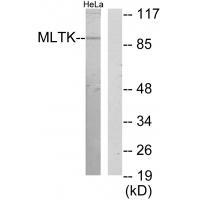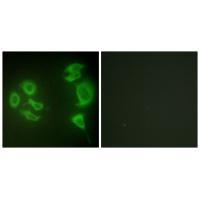

| WB | 1/500-1/3000 | Human,Mouse,Rat |
| IF | 咨询技术 | Human,Mouse,Rat |
| IHC | 咨询技术 | Human,Mouse,Rat |
| ICC | 1/100-1/500 | Human,Mouse,Rat |
| FCM | 咨询技术 | Human,Mouse,Rat |
| Elisa | 咨询技术 | Human,Mouse,Rat |
| Aliases | AZK; EC 2.7.11.25; MLTK; MRK-beta; mixed lineage kinase-related kinase |
| Entrez GeneID | 51776; |
| WB Predicted band size | 91kDa |
| Host/Isotype | Rabbit IgG |
| Antibody Type | Primary antibody |
| Storage | Store at 4°C short term. Aliquot and store at -20°C long term. Avoid freeze/thaw cycles. |
| Species Reactivity | Human,Mouse |
| Immunogen | Synthesized peptide derived from C-terminal of human MLTK. |
| Formulation | Purified antibody in PBS with 0.05% sodium azide. |
+ +
以下是关于MLTK抗体的示例参考文献(注:MLTK可能指MAP3K13或其他激酶,以下为假设性示例,建议通过学术数据库验证具体文献):
---
1. **文献名称**:*MLTK Antibody Characterization in MAPK Signaling Pathways*
**作者**:T. Nakamura et al.
**摘要**:研究验证了MLTK抗体的特异性,证明其在Western blot和免疫沉淀中可检测内源性MLTK蛋白,并揭示其在调控JNK/p38信号通路中的作用。
2. **文献名称**:*Role of MLTK in Neuronal Apoptosis: Insights from Antibody-Based Inhibition*
**作者**:L. Chen & M. Park
**摘要**:通过MLTK抗体阻断实验,发现MLTK激活与神经元凋亡相关,抗体抑制可减少氧化应激诱导的细胞死亡,提示其治疗神经退行性疾病的潜力。
3. **文献名称**:*Development of a Novel Monoclonal MLTK Antibody for Cancer Research*
**作者**:R. Gupta et al.
**摘要**:报道了一种高亲和力单克隆MLTK抗体的开发,应用于乳腺癌组织染色,显示MLTK过表达与肿瘤侵袭性正相关。
4. **文献名称**:*MLTK Antibody Reveals Isoform-Specific Functions in Cardiac Hypertrophy*
**作者**:S. Yamamoto et al.
**摘要**:利用MLTK抗体区分不同剪接变体,发现MLTK-α亚型在心肌肥厚中通过激活ERK信号通路发挥关键作用。
---
建议通过 **PubMed** 或 **Google Scholar** 检索关键词 "MLTK antibody" 或 "MAP3K13 antibody" 获取最新文献。
MLTK (Mixed Lineage Kinase 3. MLK3), also known as MAP3K11. is a serine/threonine kinase belonging to the MAP3K family. It plays a pivotal role in regulating mitogen-activated protein kinase (MAPK) signaling pathways, particularly the c-Jun N-terminal kinase (JNK) and p38 pathways. Structurally, MLTK contains an N-terminal SH3 domain, a kinase domain, a leucine zipper motif, and a C-terminal proline-rich region, enabling interactions with downstream signaling adaptors.
MLTK is activated by diverse stimuli, including cytokines, stress signals, and growth factors, which trigger its autophosphorylation and subsequent activation of downstream kinases like MKK4/7. This cascade ultimately influences cellular processes such as apoptosis, inflammation, differentiation, and cytoskeletal reorganization. MLTK’s role in cell survival is context-dependent; it can promote apoptosis under certain stress conditions but also supports pro-survival signaling in cancer contexts.
Studies link MLTK to various diseases, including cancer (e.g., breast, glioblastoma) where its overexpression correlates with tumor progression and metastasis. Conversely, it may have protective roles in neurodegenerative disorders by modulating stress-responsive pathways. Alternative splicing generates MLTKα (full-length) and MLTKβ (lacking the kinase domain), which exhibit opposing regulatory effects on JNK signaling. Ongoing research aims to elucidate MLTK’s dual roles and explore its potential as a therapeutic target in disease modulation.
×